Today Current Affairs: 21st October 2021 for UPSC IAS exams, State PSC exams, SSC CGL, State SSC, RRB, Railways, Banking Exam & IBPS, etc
Table of Contents
Bhaskarabda: A Luni-Solar Calendar:
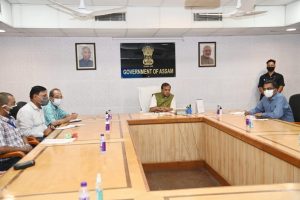
The Assam Government has announced that Bhaskarabda, a Luni-Solar Calendar will be used as an official calendar.
- Presently, the official calendar of Assam government makes use of the Saka calendar and the Gregorian calendar.
- However, the Bhaskarabda calendar will also be used from now onwards.
- Bhaskarabda, an era counted from the date of the ascension of a 7th-century local ruler Bhaskar Varman.
- It is based on both the phases of the moon and the solar year.
- It began when Bhaskaravarman was crowned ruler of the Kamrupa kingdom.
- He was a contemporary and political ally of northern Indian ruler Harshavardhana.
- The gap between Bhaskarabda and Gregorian is 593 years.
Type of Calendars:
- Solar: Any dating system based on the seasonal year of approximately 365 1/4 days, the time it takes the Earth to revolve once around the Sun.
- Lunar: Any dating system based on a year consisting of synodic months—i.e., complete cycles of phases of the Moon.
- Luni-Solar: In the lunisolar calendar months are lunar but years are solar, it was used in the early civilizations of the whole Middle East and in Greece.
Bhaskarvarman (600–650):
- He belonged to the Varman dynasty and was the ruler of Kamarupa Kingdom.
- Kamarupa was one of the most advanced kingdoms in India under Bhaskaravarman. Kamarupa was the first historical kingdom of Assam.
- His name has been immortalised in the accounts of the Chinese Buddhist pilgrim, Xuanzang, who visited Kamarupa during his reign.
- He is known for his alliance with Harshavardhana against Shashanka, the first major ruler of Bengal (Karnasuvarna).
New Quadrilateral Economic Forum:
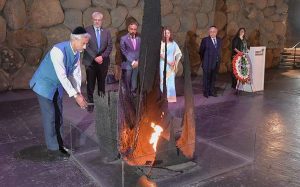
India, Israel, the United Arab Emirates and the United States have decided to launch a new quadrilateral economic forum, as External Affairs Minister S. Jaishankar joined his counterparts at a videoconference from Jerusalem, where he is on a five-day visit.
- The quadrilateral builds on ongoing cooperation between the U.S., Israel and the UAE after the Abraham Accords last year, and the India, Israel and UAE cooperation that was launched since.
- Jaishankar’s travel to Israel is also routed via the UAE, on flights that started as a consequence of the Abraham Accords and the opening of diplomatic missions and flights between them.
- The grouping had decided to establish an international forum for economic cooperation, and specifically discussed “possibilities for joint infrastructure projects”.
- The four Ministers discussed “expanding economic and political cooperation in the Middle East and Asia, including through trade, combating climate change, energy cooperation, and increasing maritime security,” as well as ways to counter the COVID-19 pandemic.
Bio-Economic Hub:

Union Minister Dr Jitendra Singh said that Northeast will be developed as India’s Bio-Economic Hub.
- The Eastern Himalayan Region is one of the mega-biodiversity rich zones and is among the 34 biodiversity Hotspots of the world.
- There is a need to put these invaluable genetic resources to use for the economic growth of the region through biotechnological interventions.
- He was speaking after visit to the Institute of Bio-resources and Sustainable Development in Imphal.
- Dr Jitendra Singh said, due to consistent and renewed focus of NDA Government, India will be recognized as a Global Bio-manufacturing Hub by 2025 and will figure among the top 5 countries of the world.
- He said, India’s Bio-Economy is on its way to achieve 150-billion-dollar target from the current 70 billion-dollar by 2025 and will contribute effectively to vision of a 5 trillion-dollar economy by 2024-25.
Bachelor Of Sowa Rigpa Medicine And Surgery (BSRMS):
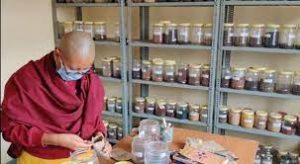
The University Grants Commission has issued notification recognizing Bachelor of Sowa Rigpa Medicine and Surgery (BSRMS) under the specified Degrees.
- Duration of the degree will be of minimum of five years and Ten plus Two (10+2) is fixed as entry qualification.
- In a gazette notification issued on 14th of October, UGC recognized BSRMS as a new degree under Medicine & Surgery, Ayurveda, Unani, Homeopathy and Health & Allied Sciences, Pharmacy, Paramedical and Nursing.
- Sowa Rigpa is a traditional and popular medicinal practice in the Himalayan region.
- So far, only two deemed to be universities, namely Central Institute of Buddhist Studies (CIBS) in Leh and Central Institute of Higher Tibetan Studies (CIHTS) located in Saranath are offering the degree in Sowa Rigpa medicine.
- With UGC recognition, any university could offer BSRMS degree in their colleges.
Modi Van:
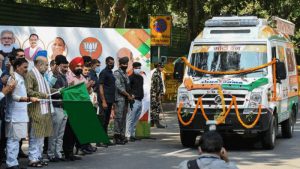
Home Minister Amit Shah flagged off Modi Van under the ‘Seva Hi Sangathan’ programme to commemorate Prime Minister Narendra Modi completing 20 years as the Head of Government.
- Five Mobile Medical Vans will operate in five Assembly Constituencies in Kaushambi district of Uttar Pradesh.
- They will work under the aegis of Kaushambi Vikas Parishad run by BJP’s National Secretary Vinod Sonkar.
- The Modi van will consist of a 32-inch television and a high-speed internet service which will broadcast PM Modi’s monthly radio broadcast ‘Mann Ki Baat’.
- The van will also consist of telemedicine.
- The van has is equipped with a machine that can test 39 blood samples in one go.
- This van will be used to administer the oath to the people of the village for cleanliness and plastic-free.
- PM Modi completed 20 years as the head of a government, including over 13 years as Gujarat chief minister this month.
- He served as Gujarat CM between 2001 and 2014.
NASA’s Perseverance Rover:

NASA’s Perseverance rover has clicked a panorama view of the “South Seitah” region of Mars’ Jezero Crater, offering clues to the area’s mysterious past.
- The images reveal the gray, darker gray, and Swiss-coffee-coloured rocky outcrops of the ridge nicknamed “Faillefeu” (after a medieval abbey in the French Alps).
- NASA’s Perseverance rover is exploring the Jezero Crater on Mars and attempting to collect its first rock samples.
About Perseverance Rover:
- It was launched in 2020 aboard a United Launch Alliance Atlas V.
- It carried a unique instrument, MOXIE or Mars Oxygen ISRU Experiment: which for the first time manufactured molecular oxygen on Mars using carbon dioxide from the carbon-dioxide-rich atmosphere (ISRU means In Situ Resource Utilization: or the use of local resources to meet human needs or requirements of the spacecraft).
- It carried Ingenuity, the first ever helicopter to fly on Mars.
- It is the planned first step to bring back rock samples from Mars for analysis in sophisticated laboratories on Earth: with the goal of looking for biosignatures: or signatures of present or past life.
Mission objectives:
- Look for signs of ancient microbial life.
- Collect Martian rock and dust samples for later return to Earth.
- Deliver an experimental helicopter.
- Study the climate and geology of Mars.
- Demonstrate technology for future Mars missions.
Fugitive Economic Offender:

Fugitive diamond merchant Nirav Modi’s attempts to get the fraud allegations against him dismissed suffered a major setback after the bankruptcy court in New York dismissed his petition.
- UK High Court had granted fugitive diamond merchant Nirav Modi permission to appeal against a magistrates’ court order, in favour of extradition to India to face charges of fraud and money laundering before the Indian courts, on mental health and human rights grounds.
- The U.K.’s Home Department, in April 2020, approved the extradition of diamond merchant Nirav Modi to India in connection with the ₹13,758 crore Punjab National Bank (PNB) fraud.
- This came two months after the Westminster Magistrates’ Court in London ruled that a prima facie case was made out against him.
Fugitive economic offender:
- A special court, in December 2019, declared diamond businessman Nirav Modi a fugitive economic offender, on a plea of the Enforcement Directorate.
- A person can be named an offender under the law if there is an arrest warrant against him or her for involvement in economic offences involving at least Rs. 100 crore or more and has fled from India to escape legal action.
- The investigating agencies have to file an application in a Special Court under the Prevention of Money-Laundering Act containing details of the properties to be confiscated, and any information about the person’s whereabouts.
- The Special Court will issue a notice for the person to appear at a specified place and date at least six weeks from the issue of notice.
- Proceedings will be terminated if the person appears. If not the person would be declared as a Fugitive Economic Offender based on the evidence filed by the investigating agencies.
- The person who is declared as a Fugitive Economic Offender can challenge the proclamation in the High Court within 30 days of such declaration according to the Fugitive Economic Offenders Act, 2018.
Global Food Security Index 2021:
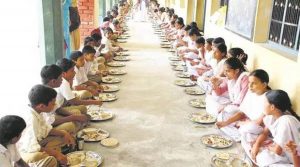
India is ranked at 71st position in the Global Food Security (GFS) Index 2021 of 113 countries.
- Earlier, India was ranked 101st position in the Global Hunger Index (GHI) 2021.
- The GFS Index was designed and constructed by London-based Economist Impact and is sponsored by Corteva Agriscience.
- The 2021 GFSI is the tenth edition of the index. It is published every year.
- It measures the underlying drivers of food security based on the following factors:
- Affordability
- Availability
- Quality and Safety
- Natural Resources and Resilience
- It considers 58 unique food security indicators including income and economic inequality – calling attention to systemic gaps and actions needed to accelerate progress toward United Nations Sustainable Development Goal of Zero Hunger by 2030.
Findings of the Report (India and World):
- Top Rankers: Ireland, Australia, the UK, Finland, Switzerland, the Netherlands, Canada, Japan, France and the US shared the top rank with the overall GFS score in the range of 77.8 and 80 points on the index.
- India’s Rank: Overall Position: India held 71st position with an overall score of 57.2 points on the GFS Index 2021 of 113 countries
- In Comparison to Neighbouring Countries: It fared better than Pakistan (75th position), Sri Lanka (77th Position), Nepal (79th position) and Bangladesh (84th position). But the country was way behind China (34th position).
- However, over the past 10 years, India’s incremental gains in overall food security score were lagging behind that of Pakistan, Nepal and Bangladesh.
- India’s score improved only by 2.7 points to 57.2 in 2021 from 54.5 in 2012 when compared with Pakistan by 9 points (to 54.7 in 2021 from 45.7 in 2012).
- Pakistan scored better than India in the food affordability category and Sri Lanka was even better. On the remaining 3 factors, India scored better than Pakistan, Nepal, Bangladesh and Sri Lanka.
PM’s 60-Point Action Plan:

The Centre has prepared a comprehensive 60-point action plan.
- The action plan is targeted at specific ministries and departments, but a closer analysis suggests they fall under broadly three buckets: leveraging IT and technology for governance, improving business climate, and upgrading the civil services.
Leveraging IT and Technology for Governance:
- There are several actionable inputs for the Ministry of Electronics and Information Technology from streamlining disbursement of scholarships to bridging digital divide for underprivileged students by developing indigenous tablets and laptops.
- Digitising all land records by 2023 under the central database called ‘Matribhumi.’ Integration with e-Courts system will provide transparency on title/possession related issues.
- Citizenship may be linked to birth certificates through technology and mainstreamed.
Improving Business Climate:
- It includes doing away completely with certain permissions, reducing the cost of starting a business in 10 sectors and bringing it on a par with Vietnam and Indonesia, automatic notification of clearances, single-point access to all government services.
- Incentives to states for timely land acquisition and forest clearances, one comprehensive Environment Management Act that subsumes various laws in the sector.
- Mentoring platform for start-ups and skilling programmes for emerging sectors.
- Using Geographic Information System (GIS) mapping for decision making to increase the country’s GDP (Gross Domestic Product).
- Pushing for jobs while negotiating trade pacts.
Upgrading the Civil Services:
- Capacity building (Mission Karamyogi) – training of officers on various aspects of infrastructure in both the Centre and states, infusion of expertise and exposure to latest technologies for higher civil services.
- Performance-based working, clear and specific targets for ministries and departments just like that for public sector undertakings, institutional mechanisms for addressing issues of states given their limited capacities and restructuring of departments through Government Process Re-engineering (GPR) every 10 years.
- GPR is undertaken to address ‘problems’ or ‘needs’ of the organization or its customers with an objective to improve the overall quality of the services.
- Appointment of more Chief Information Officers (CIOs) and Chief Technology Officers (CTOs) as data is not being used efficiently. All government data should be made accessible to all ministries.
Consent Of AG On Contempt Proceedings:

The Attorney General for India KK Venugopal recently declined to grant consent to initiate criminal contempt proceedings against the National President of Azad Samaj Party, Chandra Shekhar Azad for his comments levelling allegations against the judges of the Supreme Court.
- The AG was considering a request to grant consent under Section 15(1)(b) of the Contempt of Courts Act, 1971 to initiate contempt proceedings against Azad.
- The Contempt of Courts Act 1971 defines civil and criminal contempt, and lays down the powers and procedures by which courts can penalise contempt, as well as the penalties that can be given for the offence of contempt.
- Contempt of court is the offense of being disobedient to or disrespectful toward a court of law and its officers in the form of behavior that opposes or defies the authority, justice and dignity of the court.
- The objective behind requiring the consent of the Attorney General before taking cognizance of a complaint is to save the time of the court.
- This is necessary because judicial time is squandered if frivolous petitions are made and the court is the first forum for bringing them in.
- The AG’s consent is meant to be a safeguard against frivolous petitions, as it is deemed that the AG, as an officer of the court, will independently ascertain whether the complaint is indeed valid.
- The AG’s consent is mandatory when a private citizen wants to initiate a case of contempt of court against a person.
- However, when the court itself initiates a contempt of court case the AG’s consent is not required.
- This is because the court is exercising its inherent powers under the Constitution to punish for contempt and such Constitutional powers cannot be restricted because the AG declined to grant consent.




